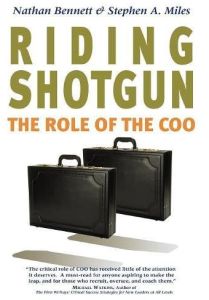Join getAbstract to access the summary!

Join getAbstract to access the summary!
Nathan Bennett and Stephen A. Miles
Riding Shotgun
The Role of the COO
Stanford UP, 2006
What's inside?
Although chief operating officers mostly fly under the public radar, don’t underestimate their corporate importance.
Recommendation
If you’re searching for the textbook example of a COO, look no farther than Tonto, the Lone Ranger’s loyal and trustworthy right-hand man. Sharing the Lone Ranger’s vision of delivering frontier justice, Tonto checked his ego at the door. Instead of trying to figure out how to unseat his CEO – the Lone Ranger – Tonto faithfully and skillfully performed his duties. They complemented each other beautifully and made a great team. COOs in today’s corporate environment face complex and difficult challenges, but the essence of the job hasn’t changed much since Tonto hitched up a saddle. Intelligence, reliability and integrity are just a few of the essential qualities COOs must possess, according to Nathan Bennett and Stephen A. Miles. The authors use solid information from extensive interviews with leading corporate executives to carefully dissect the COO’s role and explain strategies for maximizing this position in your company. In fact, getAbstract believes the only thing missing from this highly recommended book is Tonto’s input. The lesson here: the Lone Ranger isn’t so “lone,” and neither is the CEO.
Summary
About the Authors
Nathan Bennett is senior associate dean and professor of management at the Georgia Institute of Technology. Stephen A. Miles is a partner in a major executive search firm, where he handles international leadership positions.

















Comment on this summary